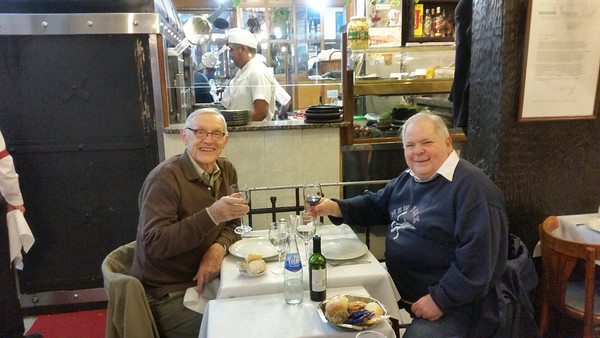|
|
Father Claude

As I was saying.....
I embrace the world from my backyard at the University of Portland, January 1, 2018. I again invite you to "clod-hop" with me on my journeys to Latin America via this blog. More...
Contact Me
Subscribe to this blog |
Categories
Navigation Calendar
Days with posts will be linked
Most Recent Posts
|
|
|
A GOOD STEAK, BOTTLE OF WINE, FRIENDS: EL ESTABLO
(Category: Chile and Argentina)

 Claudio and Quique
Claudio and Quique
|
I made a commitment to my foodie readers. In the last posting, I promised to talk about food, relating to my visits to Santiago and Buenos Aires. In the photo, I am with my friend Quique de Marco-Naon, We were at “El Establo” (The Stable), an iconic Argentine steak house. We were waiting for our orders. The chef, is behind us. Part of the joy of eating at a Buenos Aires restaurant, is the quality of the waiters and watching the chef cook your meal. Our chef gave us the impression that we were his only customer. Many waiters in Buenos Aires – the better ones – take pride in memorizing everyone’s order, checking twice to make sure that they have the right order, for the right person.
Buenos Aires and Santiago have different approaches to dining out. On the one hand, “Santiaguiños” (Chileans who live in Santiago) take great pride in their way of serving fish. Although one can expect delicious “cazuelas” of all kinds (with meat), it is the Conger chowders, the fresh-caught fish, and all kinds of sea urchins and other creatures that characterize good eating in Santiago. On the one hand, Chileans are often reserved and even mystical about their fish platters. A good chowder becomes a mystical experience, lifting one to a culinary, out-of-body experience – according to Pablo Neruda, Chile’s national poet.
On the other hand, the best way to describe an Argentine steak is earthy and juicy, where smell and the sizzle in the background reminds one of the gauchos herding cattle for the slaughter. Ok, I exaggerate, but never, never pass up an invitation for a steak in Buenos Aires.
A Tip of the Hat to Uganda and friends in East Africa. This blog originated, after all, from my academic experiences in Uganda. Although I haven’t returned recently, I have not lost touch, nor forgotten my promise to return for the dedication of the Graduate School of Diplomacy and International Relations. Although Ebola is dominating news from West Africa, a recent death of a citizen in Kampala from Marburg Hemorrhagic Fever (a rare virus, related to Ebola) will undoubtedly add to fear and confusion. While this has shifted my focus to East Africa, the topic that has also interested me in recent years is the remarkable recovery of Rwanda from the 1994 slaughter of Hutus and Tutsis, and the role of President Paul Kagame in the development of that country.
Until recently, I considered Kagame to be a model leader. It’s more complicated than that. My understanding of the role and personality of Kagame was shaped by the unconditional support for him by former President Bill Clinton and Prime Minister Tony Blaire, as well as the many books and articles praising the role of Kagame. Stephen Kinzer – a respectable author who wrote a favorable account of Kagame in A Thousand Hills – was also influential. Until recently, Rwanda was considered a model country for social and economic development in Africa. Kagame’s version of events leading out of genocide are now seriously doubted by many. This revision is a result, among other things, of Mahmood Mamdani’s new book, When Victims Become Killers (2014), and a BBC documentary on Kagame “Rwanda’s Untold Story (2014) Mamdani is a very respected Uganda scholars He teaches at Makerere University, and holds a chair at Colombia University. The BBC documentary is serious and scholarly, with interviews and new research and facts. I suppose this isn’t the first instance of victims becoming killers, but it is an especially dramatic one. In the case of Kagame, anyone who questions his version of “The Rwandan Holocaust” is silenced or eliminated. This is one more example of a political leader using victimization and a self-serving version of a “holocaust” to justify political repression and military occupation. Plus ça change…
Back to Chile, with the longest coastline in the world. A recent report by the World Wildlife Fund warns that Latin America is especially vulnerable to losing much of its wildlife because of environmental destruction Hard to say, according to some, whether Chile is most careless about its environment, most vicious with its indigenous Mapuches, or most obstinate in its relations with Bolivia and Peru. Maybe all three.
President Bachelet, who was recently elected for a second term, faces protests and challenges on all levels. Bolivian and Peruvian governments are still resentful of the loss of territory to Chile during the War of the Pacific in the late 19th century. The debate has shifted from the national stage to the Hague, and to international law. Meanwhile, students are protesting and marching in the streets to emphasize the poor quality of public education and the inaccessibility of higher education. President Bachelet is introducing legislation to make higher education free for everyone, as it is in Argentina. Unfortunately, Chile’s public schools are known to be awesomely mediocre with poor teachers. A slowdown in economic growth and higher unemployment has also stirred the emotional pot. Finally, the debate over violations of human rights during the Pinochet dictatorship (1973 – 1989) continues to dominate public discourse. In spite of these problems, Chile continues to be a model of development for Latin America – at least for some of us.
|

|
|
|
|